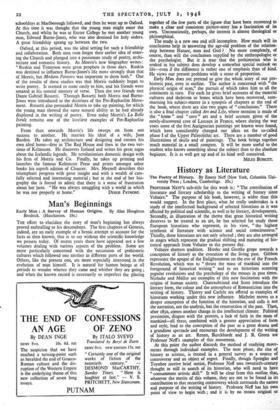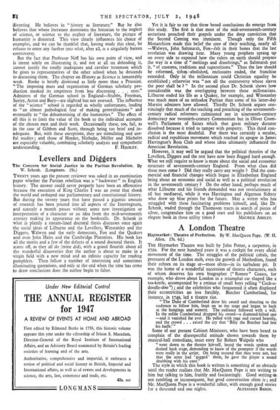History as Literature
The Poetry of History. By Emery Neff (New York, Columbia Uni- versity Press ; London, Cumberlege. 20s.)
PROFESSOR NEFF'S sub-title for this work is : " The contribution of literature and literary scholarship to the writing of history since Voltaire." The purpose of his book, however, is wider than this would suggest. In the first place, what he really undertakes is a study of the intellectual background of selected historians as it was affected by political and scientific, as well as by literary, developments. Secondly, in illustration of the theme that great historical writing deserves to be treated as an art, he has selected for study those European historians who represent, in his view, " the highest synthesis of literature with science and social consciousness." Thirdly, these historians are not only selected ; they are also arranged in stages which represent the gradual shifting and maturing of his- torical approach from Voltaire to the present day.
Voltaire shatters tradition. Herder and Goethe grope towards a conception of history as the evocation of the living past. Gibbon represents the apogee of the Enlightenment on the eve of the French Revolution, which was to " thrust the mass of mankind into the foreground of historical writing " and to set historians scanning popular revolutions and the psychology of the masses in past times. Niebuhr and Muller are examples of this new fascination with the origins of human society. Chateaubriand and Scott introduce the literary form, the colour and the atmosphere of Romanticism into the writing of history. Thierry and Carlyle are offered as examples of historians working under this new influence. Michelet moves to a deeper conception of the function of the historian, and calls it not the narration, not the analysis, but the resurrection of the past. Then, after 5850, comes another change in the intellectual climate. Political pessimism, disgust with the present, a lack of faith in the mass of mankind—all these, combined with a greater appreciation of form and style, lead to the conception of the past as a great drama and a grandiose spectacle and encourage the development of the writing of history as an art. Renan, Burckhardt and J. it Green are Professor Neff's examples of this movement.
At this point the author discards the method of studying move- ments through individual examples. The next phase, the rise of history as science, is treated in a general survey as a source of controversy and an object of regret. Finally, though Spengler and Toynbee receive brief notice, Professor Neff sees twentieth-century thought as still in search of its historian, who will need to have "consummate artistic skill." It will be clear from this outline that, whatever the merits of this volume, they are not to be found in its contribution to that recurring controversy which surrounds the nature and purpose of the writing of history. Professor Neff has his own point of view to begin with ; and it is by no means original or diverting: He believes in " history as literature." But he also believes that where literature dominates the historian to the neglect of science, or science to the neglect of literature, the picture of humanity is distorted. This view clearly influences his choice of examples, and we can be thankful that, having made this clear, he refuses to enter any further into what, after all, is a singularly barren controversy. But the fact that Professor Neff has his own point of view, and is intent solely on illustrating it, and not at all on defending it, cannot justify the totally inadequate and cavalier treatment which he gives to representatives of the other school when he descends to discussing them. The chapter on History as Science is lamentably weak. Ranke is briefly dismissed as little more than a Prussian. "The imposing mass and organisation of German scholarly pro- duction masked its emptiness from less discerning . . . eyes." Admirers of the German school in England—Stubbs, Freeman, Seeley, Acton and Bury—are slighted but not assessed. The influence of the " science " school is regarded as wholly unfortunate, leading to " an almost pathological fear of making generalisations " and eventually to " the dehumanising of the humanities." The effect of all this is to limit the value of the book to the individual accounts of the chosen men and their work. Occasionally these, too, fail, as in the case of Gibbon and Scott, through being too brief and in- adequate. But, with these exceptions, they are stimulating and use- ful studies ; and those of Herder, Niebuhr, Muller and Michelet are especially valuable, combining scholarly analysis and sympathetic







































 Previous page
Previous page